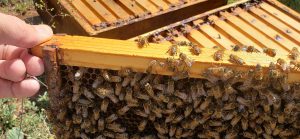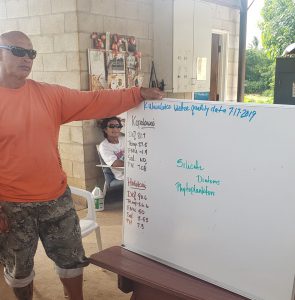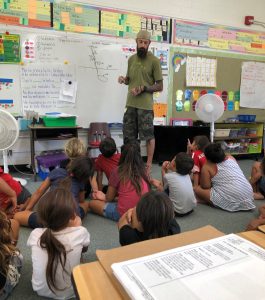Graduate Spotlight
“My academic journey began with a passion for conservation, but I soon became aware of the problems with our food system. Through volunteering in the community, attending organic agriculture lectures, ʻāina-based workshops, and networking with my peers, I felt capable of obtaining a degree in SCFS and committing myself to a lifelong pursuit.”
– Christopher Bewell, Sustainable Community Food Systems
Checking in to hear about our students' experiences and see what they've accomplished!
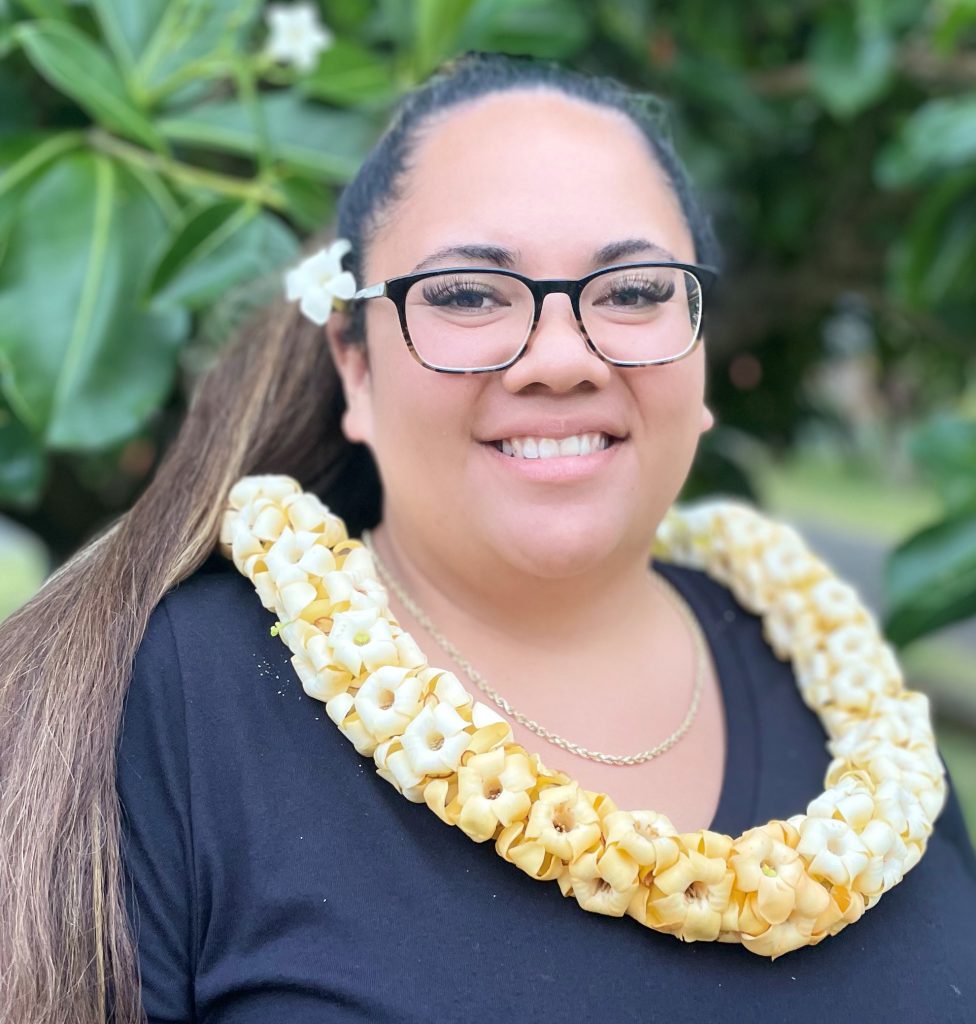
Rainbow Uliʻi
_________________________
BAS, Sustainable Community Food Systems, University of Hawaiʻi – West Oʻahu (2020)
BA, Political Science, University of Hawaiʻi – West Oʻahu (2020)
MA, Urban and Regional Planning, University of Hawaiʻi at Mānoa (2022)
“I started this program to be more connected with ʻāina. As a Native Hawaiian, I found it important to weave this relationship into my lifestyle and to benefit the people around me by sharing that awareness. After completing the program, I understand how important systems change is and how I can generate that change through my work in the UH System, and across the greater food system of Hawaiʻi.”
Current Work: In 2022, Rainbow graduated from UH Mānoa with a Master’s degree in Urban and Regional Planning focusing on food system planning. She currently serves as the Executive Director of KEY Project, a nonprofit in Kahaluʻu, Oʻahu.
Favorite Classes & Experiences
SCFS 484 – Agriculture, Food, and Human Values
“This class was great because it helped me to identify where I stand involving my beliefs concerning food and current agriculture practices.”
SCFS 350 – Natural History of Bees, Beekeeping, and Honey Hunting
“This course was super interesting because we learned about the large scope of pollinators, and we had the opportunity to work hands-on with beehives.”
Best Research & Writing Assignments
Ecological and Public Health Impacts of Industrial Meat Production
“This paper allowed me to dig deep into the industrial agriculture sector and understand why meat consumption is a huge issue in relation to public and environmental health.”
The Importance of Pollinator Species and the Drivers of Global Decline
“Writing this paper encouraged me to look at the broader importance of pollinators and how they are crucial to the food system.”
Food System Practicum

Farming System Practicum
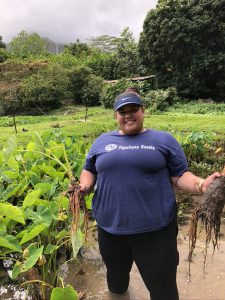
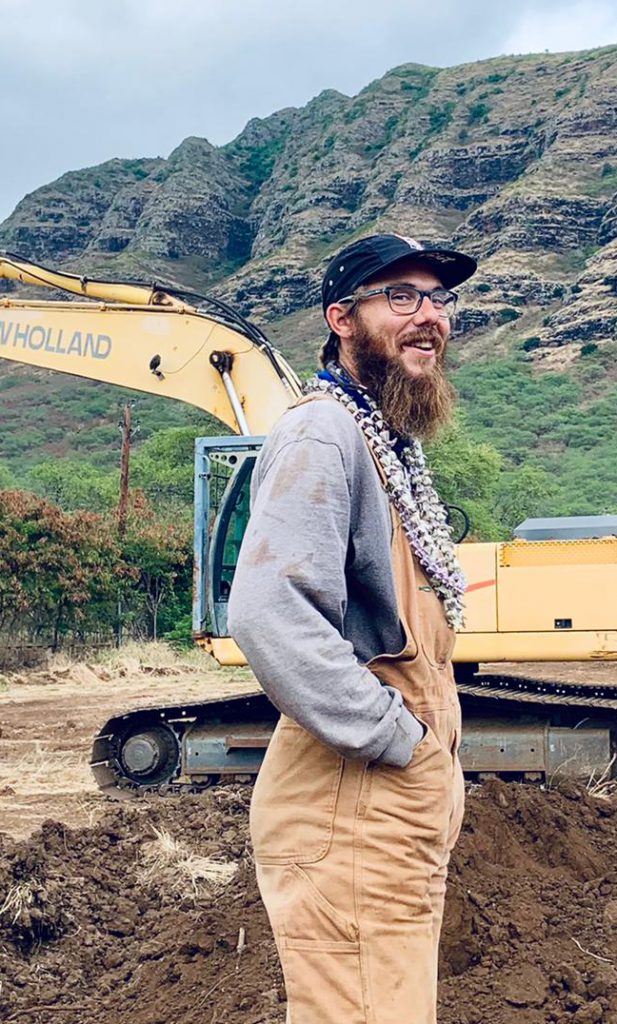
Christopher Bewell
___________________________
BAS, Sustainable Community Food Systems, University of Hawaiʻi – West Oʻahu (2020)
“Prior to SCFS I was unsure of what a community was and how to play a role in one. Now, I see myself as an advocate in delivering accurate information regarding our local food system to members of my community in informal social spaces, such as farmers markets transactions, leading coworkers in farm-based tasks, and participation in sustainability events. In the workplace, I grow, deliver, nurture, clean, irrigate, and suppress in methods that are congruent with current agroecological methods (when possible).”
Current Work: After transitioning through a manager track at MAʻO Organic Farms, following a 2-year employment, Chris is currently working there as a farmer.
Favorite Classes & Experiences
SCFS 484 – Agriculture, Food, and Human Values
“This class deeply challenged my internal motivations and values in a meaningful way. I believe every student at UHWO should have an opportunity to take this enriching course.”
“Politics of Food was the ideal balance between coursework and getting outside of the classroom and into the community with practitioners. More classes in the UH system should follow this approach to acquiring knowledge and experiencing real-world interactions.”
Best Research & Writing Assignments
The Effects of Neonicotinoids on European Honeybees
I deeply enjoyed diving into the literature and exploring this topic.
Obstacles That Limit, Prevent, or Delay Conventional Farms from Transitioning to Organic Farming Systems
“I really enjoyed the ‘big picture’ focus on what is causing our national farming crisis.”
Food System & Farming System Practicum

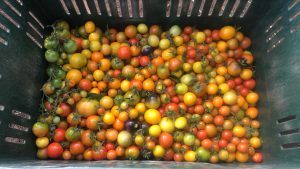
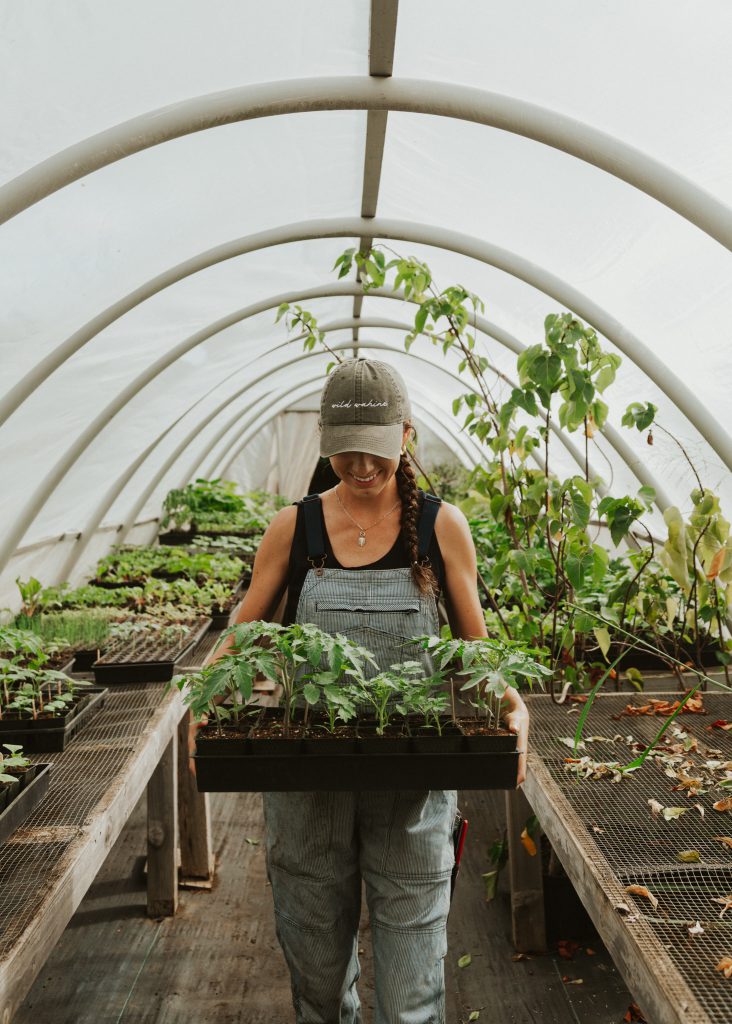
Tierra Bartolotti
________________________
BAS, Sustainable Community Food Systems, University of Hawaiʻi – West Oʻahu (2022)
“As a transfer student from UH Maui College, I felt that the Sustainable Community Food Systems program at UH West Oʻahu was a great opportunity to combine multiple areas of interest for me in my undergraduate studies. Prior to going into the SCFS program I had a strong passion for local regenerative agriculture and sustainability, and I was very involved in non-profit work.”
Current Work: Since graduating, Tierra has been hired by Kualoa Ranch as the Diversified Agriculture Administrative Assistant, where she is creating new local partnerships and working to expand local food access for neighboring communities in Hauʻula, Kaʻaʻawa, and Kāneʻohe.
Favorite Classes & Experiences
APSC 490 – Senior Food Systems Practicum
” It was such a great experience for me to be able to get hands-on experience tracking Food System & Agriculture policy during the 2022 Legislative Session. APSC 490, really helped me understand how our legislative system works & how we can participate as active citizens to create food system change.
“This was an excellent course taught by Dr. Mironesco. Understanding the politics of water was fundamental for me, especially after being directly affected by the Red Hill water crisis.“
Best Research & Writing Assignments
“My two favorite research assignments were the Action Research Paper in SCFS 300 & the Gale Feenstra Theory of Change paper in SCFS 490X. Both of these assignments were critical components of my educational experience. I really enjoyed that in the SCFS program, I got to conduct my own qualitative research with local Food Hub organizers from around Hawai’i. This paper helped me understand what our primary barriers are for local food processing.“
Food System & Farming System Practicum
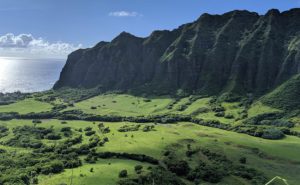
Tierra’s Senior Food Systems Practicum & Senior Farming Systems Practicum both took place at Kualoa Ranch. Kualoa is a roughly 4,000-acre private nature reserve located on Oʻahu’s Windward coast. It is a working cattle ranch, farm, and tourist attraction. Kualoa Grown, where Tierra spent her time as an intern, is the brand of Kualoa’s “diversified agricultural operation.” While working at Kualoa Grown, Tierra gained experience on many different aspects of local, diversified agriculture. The professionalism & quality mentorship she received at Kualoa Ranch helped her to directly apply the theoretical concepts of sustainable food system change she was learning in the SCFS program. During this experience, she was able to shadow many different types of agricultural operations, such as diversified organic vegetable production, small-scale livestock operations, regenerative aquaculture, orchard production, and agribusiness/market operations.
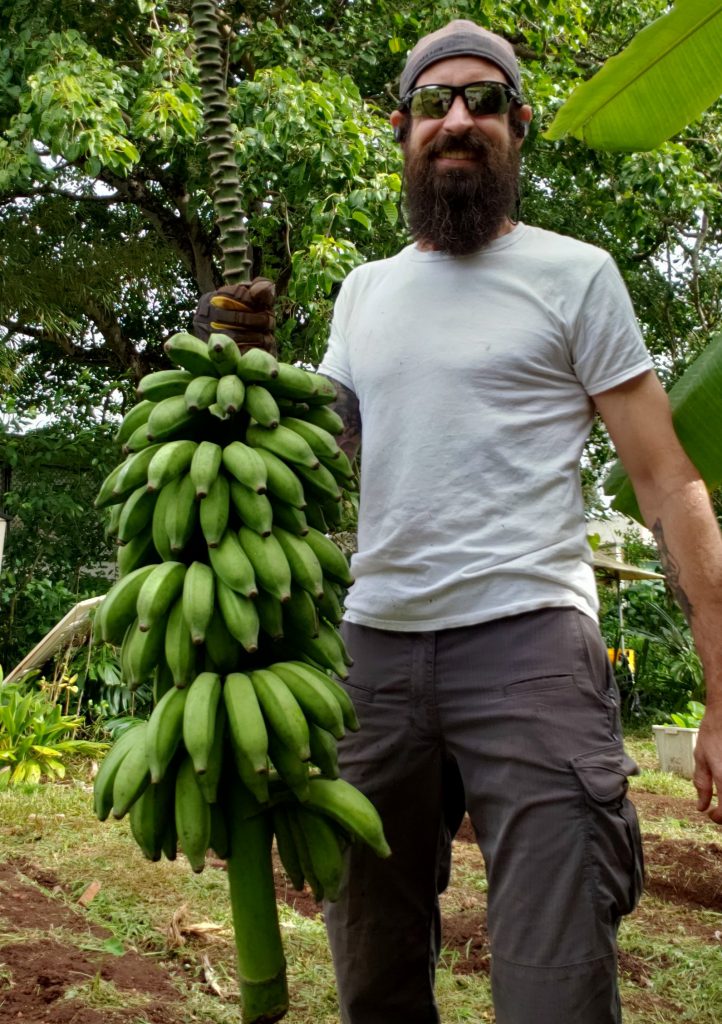
Brian "Ioane" Jahn
_________________________
BAS, Sustainable Community Food Systems, University of Hawaiʻi – West Oʻahu (2020)
“After graduating from the Hawaiian Studies program at LCC, I wanted to continue my education in a place that addressed all the major issues I had learned about which affect the land and people of Hawaiʻi. SCFS was an obvious choice because I realized fixing our food system was a foundational action for creating systemic change and securing a fundamental aspect of sovereignty that extends beyond food and farming. I hope to affect change in the community by educating our youth about food and their relationships with ʻāina so that future generations won’t have to struggle with health problems, disconnection, and dependency upon the United States for survival.”
Current Work: Since graduating, Ioane has been involved in several food system-related projects, including a position with Hawaiʻi Food+ Policy as a lead advocate lobbying for food system bills, teaching an ʻāina-based afterschool program in Wahiawā, and the creation of a learning farm spanning five acres just outside of Kūkaniloko. In addition, he is currently working as an Educational Specialist at UHWO with Dr. Albie Miles and operating as president of ʻĀina Kaiāulu, an educational nonprofit currently working to build a farming education program called Ka Hiapo.
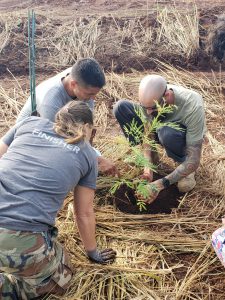
Favorite Classes & Experiences
SCFS 370 – Ahupuaʻa: Hawaiian Natural Resource Management from Mountain to Sea
“This class was great because we gained a Hawaiʻi-based perspective on land relationships/management and how many systems and environments are interconnected on several levels. Over the course of this class, I realized many of the traditional concepts for managing land and water are timeless and could realistically be adapted and applied to restore and protect resources in our current environment.“
SCFS 310 – Introduction to Agroecology: The Science of Sustainable Agriculture
“This course was extremely eye-opening for me because we learned a lot about the historical events that occurred which led us to where we now find ourselves, dealing with a failing global food system. I gained an in-depth understanding about how our food system is now based on extractive relationships between communities and chemical corporations, how private interests are diverting public resources to suit their needs in perpetuating unsustainable agricultural practices, and how these patterns will ultimately lead to total global failure on an extended timeline if we do not change our collective trajectory.”
Best Research & Writing Assignments
The Influence of Private Industry on Public Institutions of Higher Education
“This was my favorite research assignment because it allowed me to explore the extent to which private industry manipulates and redirects humanity’s attempt to advance. There were so many instances of intimidation and ethical violations in universities that directly affect our abilities to thrive and advance in sustainable directions for the future and it was important to understand that so I can identify when it’s happening in our communities.“
My Personal Food Ethic and How it Affects the World
“This was perhaps the most thought-provoking paper I have ever been assigned to write. I was forced to confront major hypocrisy in my food ethics, and I was able to reconstruct a more logical set of values concerning meat consumption, my relationship with hunting and farming, and spiritual concepts associated with food and nutrition.”
Farming System Practicum
Ioane was mentored by Uncle Aliʻi Miner at Kuhialoko wetlands in ʻEwa. This was an extremely beneficial experience that he related closely to many of the concepts and ideas explored in SCFS 370. Uncle Aliʻi showed outstanding examples regarding the transformation and reclamation of a place inundated by invasive species to become a restored, traditional Oʻahu wetland space. The most important outcome was witnessing the changes that are possible with thoughtful, kilo-based traditional restoration practices. This project highlighted the value and the need for traditional knowledge in ecological restoration as well as the significant impact these types of projects have on surrounding ecosystems and communities.
Food System Practicum
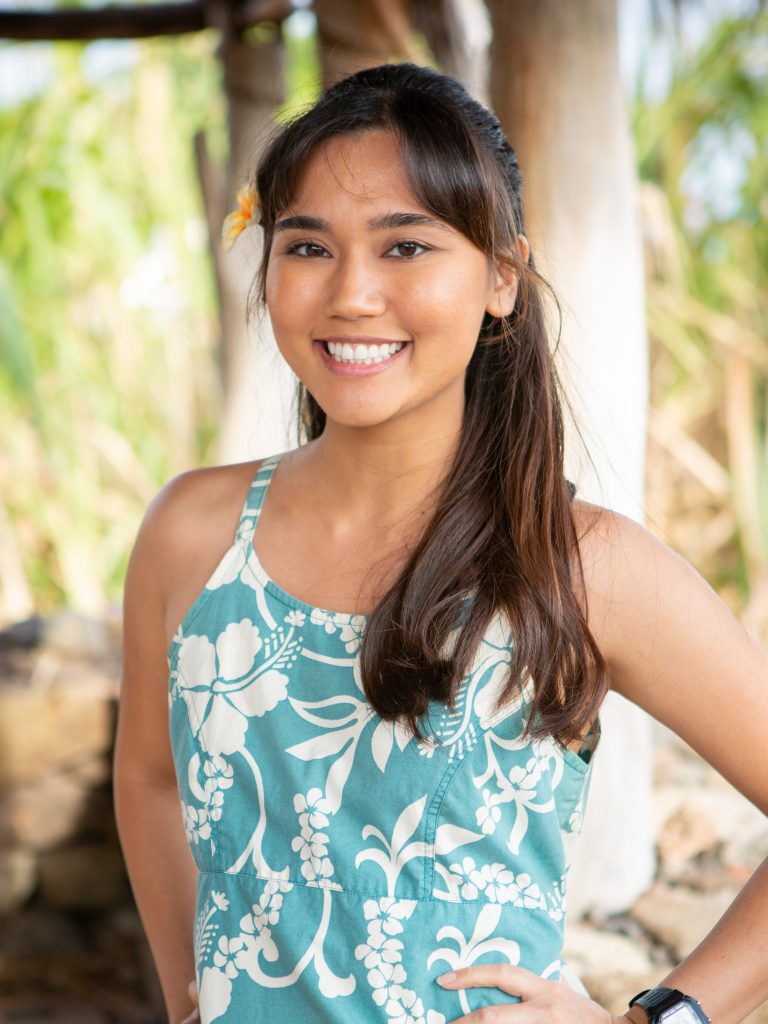
Sydney Millerd
_________________________
BAS, Sustainable Community Food Systems, University of Hawaiʻi – West Oʻahu (2021)
BA, Political Science, University of Hawaiʻi – West Oʻahu (2021)
“Upon graduating from high school, I was unsure of what I wanted to study in college; however, I have always had an interest in sustainability and protecting the environment, so I figured that I should give the SCFS program a try. After taking the introductory SCFS course, my first semester at UHWO, my eyes were opened to the complexity of our food systems and the need to make them more sustainable, resilient, and socially just. From there on out, I knew that SCFS was the field that I wanted to pursue. Now that I have this SCFS degree along with a political science degree, I see myself working in the non-profit sector on various sustainability efforts. I particularly hold an interest in working on the UN Sustainable Development Goals, so I hope to go into that area in the future.”
Current Work: Since graduating from SCFS, Sydney has gone on to do amazing things. In Summer of 2021 she participated in an internship with Purple Maiʻa to promote their programs and innovations in support of a better food system for Hawaiʻi. From Fall to Spring of 2021, Sydney served as a US Youth Ambassador at the World Expo in Dubai, and in Summer of 2022, she participated in an internship with Mālama Maunalua, which included education, outreach, conservation, and research for ecological systems spanning from the mountains to the sea. She is currently involved in a Sustainable Coastlines internship to provide support for a communications and education team working to share the mission and vision of the organization. She is also working for Pop-Up Labs for Sustainability providing weekly STEAM lessons at several Oʻahu elementary schools, with a concentration in scientific topics relating to sustainability. In addition, Sydney is on the US Youth Advisory Committee for the United Nations Oceans Decade where she will be co-chairing the committee to enhance youth voices as they strive toward the UN Ocean Decade’s goals. Sydney is also the US representative for the US-Korea Youth Climate Activist Exchange Program, which is focused on climate change efforts.
Favorite Classes & Experiences
SCFS 484 – Agriculture, Food, and Human Values
“I enjoyed thinking deeply about the consumption of meat & analyzing my beliefs that influence my own food behaviors.“
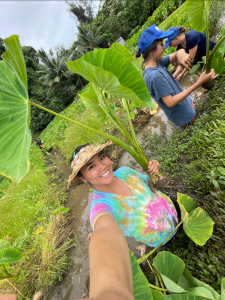
APSC 490 – Senior Food Systems Practicum
“I was part of the first [Hawaiʻi Food Plus Policy Internship] cohort & really enjoyed actually applying the food systems knowledge we learned over the years to real world work. Although virtual, it was a great team to work with.“
Best Research & Writing Assignments
A Roman Catholic’s Perspective on the Moral Status of Human Beings, Non-Human Beings, and Wild Ecosystems
“I used my religious perspective to evaluate my perspective on the moral status of human beings, non-human beings, and wild ecosystems. This paper was one of the most challenging papers I have ever written; however, I appreciate how it made me think critically about my food choices and behaviors while also bringing me closer to my faith.“
An Analysis of Hawaiʻi’s Sugar-Sweetened Beverage Fee Bills Applying Feenstra’s Theory of Food System Change
“As my final paper of my SCFS career, this paper culminated a lot of what was learned throughout my SCFS experiences while also applying the real-world work that I did as a Hawaii Food+ Policy Intern.”

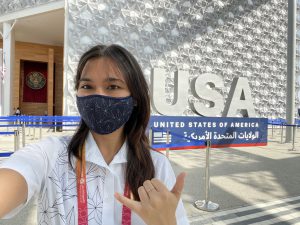
Sydney representing Hawaiʻi as a Youth Ambassador at the World Expo in Dubai where she shared ʻike regarding Hawaiʻi’s food system as a panelist on CNN’s Connect the World Special: Call to Earth.
Farming System Practicum
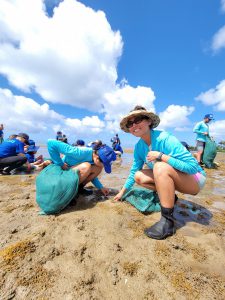
Mauka 2 Makai (M2M)
Mauka 2 Makai is a six-week summer oceanography bridge program hosted by the University of Hawaiʻi at Mānoa’s Oceanography Department. The overall goal of M2M is to increase the number and capacity of Native Hawaiians, and other underrepresented minorities, within the geosciences. The program was designed to expose students to place-based learning, field experience, research, and presenting. Sydney was mentored by Dr. Alma Carolina, Dr. Haunani Kāne, and Dr. Mariko Hatta. The final project, Impacts of loʻi on water quality in the Mānoa and Heʻeia Watershed, consisted of a thorough mauka to makai analysis of water quality in the two watersheds to better understand how water quality changes throughout a watershed system.
Food System Practicum
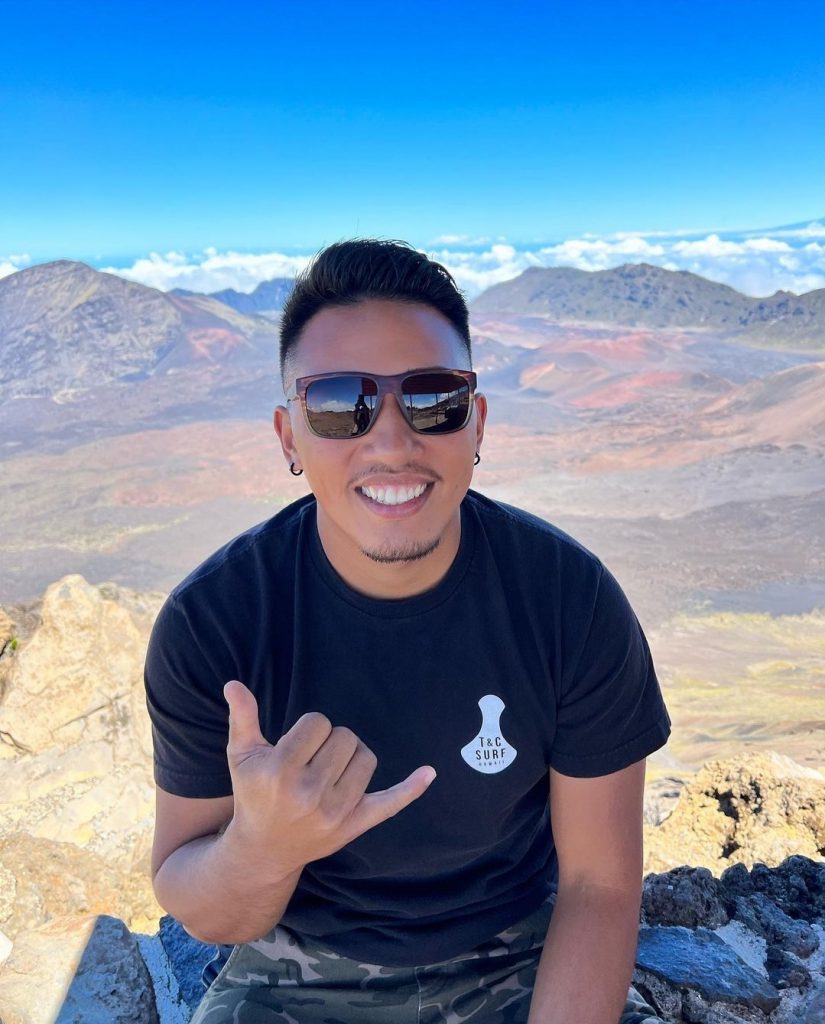
Jesse Pilialoha Mikasobe-Kealiʻinohomoku
_________________________
BAS, Sustainable Community Food Systems, University of Hawaiʻi – West Oʻahu (2022)
“On the search to find my kuleana as a young Hawaiian, i’ve learned that there was a purpose to also achieve at the same time when aina is the foundation. Ive quickly learned that the food system connects my kuleana and a meaningful purpose that serves people. I believe that a lot can get done when we work together but first it takes one to believe in a vision that will collectively benefit all. I view myself as both a food system advocate and organizer who creates social space. I spend a great deal of time networking with people in separate places to bring them together to create a space for food system change.”
Current Work: Since graduating, Jesse has gone on to work full-time as the Food Access Manager at the Waiʻanae Coast Comprehensive Health Center (WCCHC), and part-time at the Mālama Learning Center (MLC).
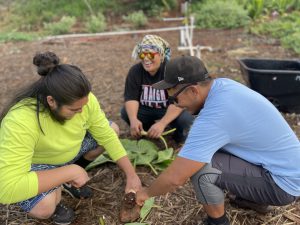
Favorite Classes & Experiences
SCFS 484 – Agriculture, Food, and Human Values
“This course had helped me on a deep level as I questioned my food ethics. It taught me that more care was needed towards how I viewed food and it had helped me with an ethical blueprint to dealing with such.“
SCFS 490 – Senior Farming Systems Practicum
“I like to say that this course allowed me to showcase my understanding of the food system and how individually, I could see myself as an agent of change.”
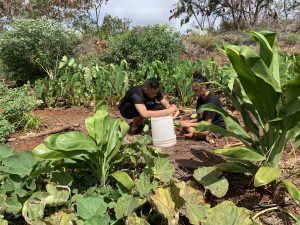
Best Research & Writing Assignments
My Personal Food Ethic
“This individual assignment allowed me to dig deeper for the period of the semester into my food ethic and what i truly believe. It helped me understand and connect my food choice with the food system. Helped me rethink my choices and how my choices impact the larger system. I took inventory on my intentions which i ultimately decided to avoid unnecessary suffering by my food choice.“
Final Assignment for SCFS 490 – Farming Systems Practicum
“This assignment stood out the most because it terrified me a lot. Though it was scary, it helped me grow tremendously both through failures and the success of carrying out our practicum objectives. What helped most was that I was able to anticipate the workload and understand the previous expectations of the course. At the end I was able to build an outside classroom that will have a positive effect on the community food system and social equity development.”
Farming System Practicum
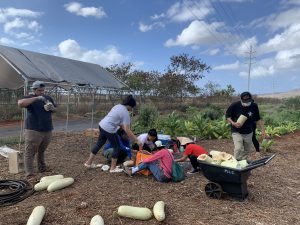
Awāwalei at the Hawaiʻi Agricultural Research Center (HARC)
Jesse was mentored by Pauline Sato and Kyle Onaga at Awāwalei in the Hawaiian Agriculture Center at Kunia. In this place, Jesse was able to gain an advanced level of understanding regarding traditional planting methods, using seed as a foundation, increasing organic matter in soils, organization of mission, structure, and priority programs, and the deeper processes of agriculture relating to natural resource conservation and management. Working between HARC and Mālama Learning Center (MLC), Jesse was able to create new avenues of community involvement, along with a sector focusing specifically on food systems.
